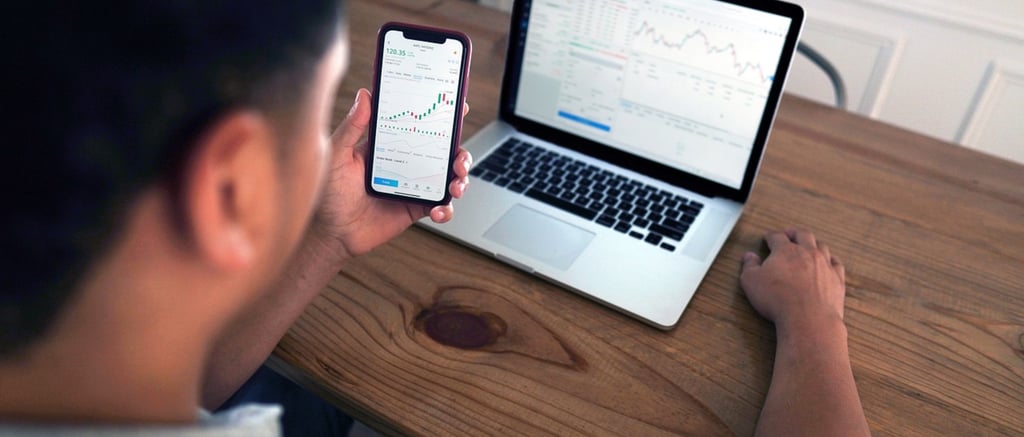Trading Psychology
Trading Psychology - The Art of Mastering Emotions
12/22/20247 min read


Trading Psychology - The Art of Mastering Emotions
Mastering psychology is a critical aspect of success. The ability to manage emotions, maintain discipline, and stay focused on long-term goals makes the difference between success and failure.
What is Trading Psychology?
Trading psychology is a field of study that deals with the emotional and mental aspects of trading. There are several key elements to trading psychology. You must be able to manage your emotions in order to make rational decisions. Fear, greed, and anxiety lead to impulsive decisions and poor outcomes. Successful are those that manage risk effectively. This involves stop loss orders and position size to ensure that potential losses are limited. Be aware of cognitive biases that Influence decision-making. These biases include overconfidence and confirmation bias.


Importance of Trading Psychology in Successful Trading
Trading psychology is essential to achieving success. Mindset, emotions, and mental state significantly influence the ability to execute effectively and manage risk. Psychology is crucial for a number of reasons.
For example, trading involves a significant amount of stress and pressure, and emotions impact decision-making. A clear head under pressure is more likely to make rational decisions and avoid making impulsive trades. Avoid making decisions based on faulty assumptions and maintain informed decisions.
Success is a well-defined trading plan and strict risk management. Maintaining discipline is crucial to achieve consistent profitability. Losing trades and periods of drawdowns are inevitable. Mindset and the ability to handle losses significantly impact the ability to succeed in the long run.
How to Master Trading Psychology
Developing a growth mindset is essential for achieving long-term success. A growth mindset is an understanding that knowledge and abilities are enhanced by a combination of hard work and perseverance. Here are some ways to develop a growth mindset:
You must understand that losing trades are a natural part of the trading process. View losses as opportunities to learn.
You are constantly learning and seeking new knowledge.
Developing a disciplined approach to trading in the beginning is essential. Follow a trading plan, set stop losses, and stick to predetermined entry and exit points.
Emotions such as fear and greed cloud judgement and lead to poor decision-making. Manage emotions and maintain a rational approach.
Strategies for Building Emotional Resilience
Emotional resilience and mental toughness is crucial. Rely on a number of strategies to build these qualities. Mindfulness is a technique that involves being fully present and engaged in the present moment. Use mindfulness practices such as meditation or deep breathing to reduce stress and improve ability to focus.
Exercising aid in stress reduction and mood enhancement. Aim to incorporate physical activity into your daily routine. A healthy diet improves mental clarity. Traders aim to eat a balanced diet with plenty of fruits, vegetables, and whole grains. Build a support network of colleagues, mentors, and friends who offer support and guidance during difficult times.
Suggestions for Staying Motivated and Focused on Trading Goals
Set specific, measurable goals related to profits, risk management, and other aspects.
Develop a detailed trading plan that outlining, entry and exit points, risk management techniques, and other key factors.
Focus on executing a strategy effectively rather than solely on the profits or losses of individual trades.


The Role of Patience and Consistency in Trading Success
Patience and consistency are essential qualities for any trader striving for long-term success. The financial markets are unpredictable, and results don’t always come immediately. Therefore, patience is key when waiting for the right setups to appear and when managing your trades. It's important to avoid the urge to jump into the market too quickly or to overtrade in an attempt to recover losses.
Consistency, on the other hand, helps traders to stick to their plans and strategies. By consistently following a structured trading plan, you minimize the influence of emotions and external factors on your decision-making. Success in trading is often the result of small, consistent wins over time, rather than large, sporadic gains.
Understanding and Managing Risk: A Crucial Component of Trading Psychology
One of the core aspects of trading psychology is how well a trader manages risk. Risk management isn’t just about the size of your trades or the stop-loss orders you set, it’s about your mental approach to taking on risk. Many traders allow fear or greed to drive their decisions, causing them to take on more risk than is comfortable or necessary.
Successful traders focus on preserving capital and risk no more than a small percentage of their account on any given trade. This approach helps prevent large losses that can severely impact their trading account and mindset. Risk management practices, like using stop-loss orders, position sizing, and diversifying across different assets, are key strategies that can help manage potential losses and keep the trading psychology in check. Accepting losses as part of the process can prevent them from becoming emotionally damaging.
Handling Drawdowns and the Role of Mental Toughness
A drawdown is the reduction of an account's equity from its peak to a trough, and handling this is one of the most difficult psychological aspects of trading. Everyone faces drawdowns - periods where your account balance decreases due to a series of losses. These periods can test your mental toughness, especially when they occur after a long streak of profitable trades.
Building mental toughness means accepting drawdowns as an inevitable part of trading. It’s important to avoid the impulse to make risky trades in an attempt to recover quickly. Instead, focus on getting back to your trading plan and staying patient. Overcoming drawdowns requires an unwavering belief in your strategy and the ability to stay disciplined, even when your confidence is shaken.
The Power of Self-Reflection and Continuous Improvement
Traders who focus on continuous self-improvement have a much higher chance of long-term success. After each trade - whether it’s a win or a loss - take the time to reflect on your decisions and outcomes. This is where journaling can be extremely helpful. By keeping a detailed trading journal, you can identify patterns in your trading behavior, recognize emotional triggers, and assess your strategy’s effectiveness.
Self-reflection isn’t just about evaluating your trades, though. It’s also about assessing your mental and emotional state. Were you too anxious during the trade? Did you allow fear or excitement to cloud your judgment? The more you become aware of these psychological patterns, the more you can work on strengthening your emotional control.


Avoiding the Trap of Perfectionism
While striving for excellence in trading is important, perfectionism can be a hindrance. Many traders make the mistake of trying to make every trade perfect, leading to overanalysis, hesitation, and missed opportunities. Aiming for perfection can create unnecessary pressure, which impacts your ability to trade with clarity and confidence.
Instead, focus on consistent, sound decision-making, and embrace the idea that no one is perfect. Mistakes are part of the learning process, and they are often the best teachers. By letting go of the desire to be perfect, you will be more open to learning from both your successes and your failures, and this openness helps improve your overall trading psychology.
The Importance of Work-Life Balance for Optimal Trading Performance
Trading can be all-consuming, especially when you are determined to succeed. However, an unhealthy obsession with trading can be detrimental to your mental and physical health, which in turn affects your performance. Maintaining a proper work-life balance is key to staying sharp and focused. Taking breaks, spending time with loved ones, and engaging in hobbies outside of trading can help you refresh your mind and prevent burnout.
A balanced life outside of trading can also provide a healthier perspective when you return to the markets. It ensures that you don’t view every loss or setback as a personal failure but instead as a natural part of the process. This mindset helps to keep your emotions in check and strengthens your psychological resilience over time.
The Role of Patience in the Face of Market Volatility
In the fast-paced world of trading, market volatility can trigger strong emotional responses. The markets are often unpredictable, and sudden price movements can cause panic or excitement. However, successful traders are able to remain patient and avoid acting impulsively during volatile market conditions.
Having the patience to wait for the right setup, even when the market is moving rapidly, can be the difference between success and failure. If you stick to your trading strategy and exercise patience, you will be better equipped to take advantage of opportunities rather than be caught off guard by emotional reactions.
Building Long-Term Resilience Through Mindset Shifts
Ultimately, trading is a marathon, not a sprint. Successful traders understand that long-term resilience is built through small, incremental mindset shifts over time. Developing a growth mindset, embracing the learning process, and continuously reflecting on your performance will help you improve. Along the way, you'll face challenges, but how you respond to those challenges will determine your success.
By focusing on progress, not perfection, and sticking to disciplined, consistent strategies, you will cultivate the mental strength necessary to succeed in the highly competitive world of trading. The journey to mastering trading psychology is ongoing, but it is a crucial component of becoming a successful, long-term trader.
In conclusion, trading psychology is not just an afterthought or secondary to technical skills. It is the foundation of every successful trader's approach. By managing emotions, adopting a growth mindset, developing patience, and practicing mindfulness, traders can navigate the ups and downs of the market with a clear mind and a steady hand. The combination of discipline, emotional resilience, and a focus on self-improvement will provide the best path toward sustained success in trading.
© 2025. All rights reserved.
You understand and acknowledge that there is a very high degree of risk involved in trading securities and, in particular, in trading forex, futures and options. Please ensure that you fully understand the risks involved. The site is providing educational content which will provide you with an indepth knowledge of the market. This site is in no way providing any investment, financial, tax, or legal advisory and do not purport to provide personalized investment, financial, tax, or legal advice in any form. None of the provided information does recommend the purchase of particular securities, nor does the provider promise or guarantee any particular results. The provider assumes no responsibility or liability for your trading and investment results, and you agree to hold the provider harmless for any such results or losses. It is up to you as a trader to make your own judgement using your own analysis.
